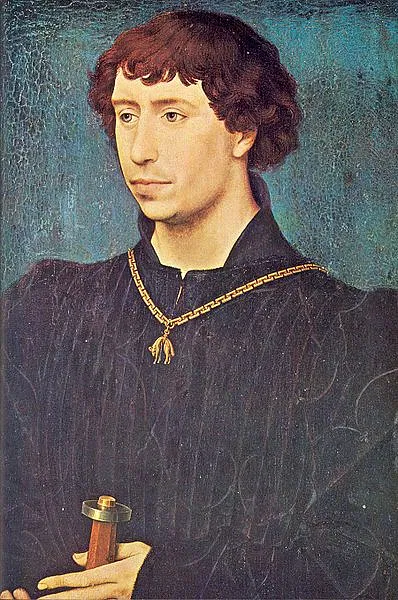In my post The claims of the Earl of Loudoun I looked at the hypothetical or arguable claims to the English - but not the Scottish - throne of the Earl of Loudoun ( from George Duke of Clarence ), Lady Kinloss ( from Lady Catherine Grey ) and the Earl of Jersey ( from Margaret Countess of Derby).
To these claims, and the much better known and more recent one of the Jacobite line, represented today by the de jure King of Bavaria, one can add another from Isabel Duchess of Burgundy (1397-1471).
There is an introduction to the life of the Duchess from Wikipedia at Isabella of Portugal, Duchess of Burgundy
As the daughter of King Joao I of Portugal and his Queen Philippa of Lancaster she set out in the last months of her life her claim to be the heiress general of the recently deceased King Henry VI and the house of Lancaster as granddaughter of John of Gaunt. In her claim she sidelined that of her nephew King Afonso V of Portugal, the son of her eldest brother.
If - and the point is debatable - the prohibition on the Beaufort family succeeding to the throne “saving the dignity royal” added to the confirmation of their legitimacy by King Henry IV is accepted as lawful then the claim of King Henry VII through his mother Lady Margaret Beaufort is negated, and the next Lancastrian claimants would be the Portuguese royal house.
Isabel Duchess of Burgundy
School of Rogier van der Weyden
Image: the Freelance History Writer
Isabel was an intelligent, well educated, cultured and forceful woman,who had been considered as a possible bride for her cousin King Henry V - the family resemblance is striking. As it was she was married in 1429 to Duke Philip the Good of Burgundy as part of the network of alliances to reinforce the Anglo-Burgundian alliance.
Shortly after producing her notarial instrument, and not long before her death, the Duchess renounced her claim in favour of her son Duke Charles - whose wife was, ironically, the sister of the Yorkist King Edward IV, and who was to be a redoubtable campaigner for the Yorkist claimants after 1485 until her death in 1503. This is set out in a recent video from History’s Forgotten People at A Dangerous Duchess To The Tudors | Margaret of York | Duchess of Burgundy
Duke Charles of Burgundy
Image: Medievalists. net
Although Duke Charles, who died at the battle of Nancy in 1477, did not do anything much with the claim - though he also took similarly formal note of it - it had been registered. Unlike some of the other claims I drew attention to in the post I linked to above this is an easy one to follow through. From Duke Charles the claim would pass to his daughter Mary and then to her son by her marriage to the future Emperor Maximilian I, Philip, who by marriage became King Philip I of Castile, fathered the Emperor Charles V who was also descended from John of Gaunt’s daughter by his second marriage, Catalina of Lancaster. Thus the claim passes through the descent of the Spanish kingdoms down to the present King Felipe VI, who under Duchess Isabel’s notarised argument could claim to be King Philip VI of England….
The Duchess’ notarised instrument is discussed and can be seen on the British Library Medieval manuscripts blog at Claim of thrones



No comments:
Post a Comment